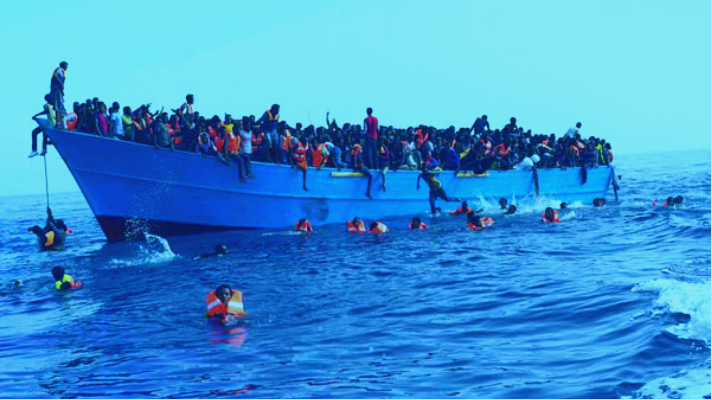The life of Babacar From a secret immigrant to a Spanish nurse battling the Corona virus

The immigrants listen closely to Mbaye Babacar Diouf, who turned his perilous voyage across the Atlantic to Spain into a success story.
Mbaye Babacar was able to integrate into his new society through the nursing profession, which today makes him one of the first-rank soldiers in the health field to confront the Corona virus, which he considers a beautiful formula to give back to the community, and also through his non-profit foundation that is achieving great success.
Speaking to the new immigrants, who have arrived from Senegal, Ghana and Morocco, Babacar warns them that he is not a role model. Behind his victories and success, he recalls, he hides the wounds of years of humiliation and exploitation while trying to pay off a 4,500-euro ($5,350) debt to the people smugglers who brought him to Spain.
“I hope each of you achieve your life goals, but I don't want anyone to go through the difficult experience I went through,” Babacar of Senegal, 33, tells the group. He is keen to make it clear to them that Europe is not a panacea if The price is to drown in the sea or for a person to live in the shadows of society forever.
Babacar admits that this message is strange from a person who built his future in Spain, through a profession that allows him today to return to his home in Dakar whenever he wants to visit a family he supports thanks to what he achieved. Today Babacar speaks fluent Spanish, showing a mixture of kindness and self-confidence before his night shift at Basurto University Hospital in Bilbao. He tells about his experience in confronting the deadly virus through his profession, saying, "Dealing with the Corona virus was stressful and emotional, I saw people dying at sea, but this is very different." He stressed, "I love my job, but there were situations that hurt me."
Before the Basque Country became his new home, Babacar had difficult nights when he had to sleep in the open and roam the streets. He also often suffered from police chases of irregular immigrants in the country, and had to be a guest in their cells more than once, until his dream of becoming a nurse seemed unattainable.
The idea grew in his imagination when he arrived in the Canary Islands at the age of fifteen, he was hungry and thirsty after a 10-day voyage between sea waves that sometimes reached 8 meters in length, he was touched by the care and sympathy of the Red Cross volunteers who showed him to him along with 137 other people who were with him in the boat . "In those moments, I promised myself that one day I would become a nurse," he says.
That was in 2003, a period during which the Atlantic road witnessed a great migration to Europe, during which the sea swallowed during those years huge numbers of souls who aspired to reach Europe to escape poverty in their countries of origin. Babakar still remembers the terrible silence on the wooden fishing boat, when, on the seventh day of their second attempt to cross, they encountered dozens of bodies floating on the surface of the water.
“I told my daughter that Mbaye is lucky.”
Boats leave again with large numbers of migrants on board, and human trafficking gangs continue to expand deep into European territory, tracking their victims wherever they go and charging them for a place to sleep, documents that enable them to access health care, or illegal small jobs.
“The boat trip can last several difficult days, but it makes it easy to adapt to a system that leaves us forgotten in a new alien land without permission to work legally,” Babakar says. Babacar's life turned for the better when he met Juan Gil, the man he now calls "Aita", his second father in Basque.
Babakar did the dishes at the bar, and then Jill needed some renovation work on the house. Soon the young worker became a guest of his family at every meal. Jill recently lost his mother and his daughter moved elsewhere, so he convinced Babakar to move in with him.
“I told my daughter that Mbaye was lucky, but she insisted that we were the lucky ones with him,” says the 74-year-old artist and retired professor, expressing Babacar’s place among his young family, who officially adopted Babacar as her title today on the front page of his Spanish passport.
And the father tells, "I was able to pay off his remaining debts, send money to his relatives, and helped him register in nursing school, and after graduation he was able to get a job in the public health service in the Basque Country," and he adds, "But his dream still continues to study medicine and return to Senegal to work as a doctor through His non-profit organization, providing assistance to the people there."
Thanks for your time😇😊😊😊🤗🤗🤗